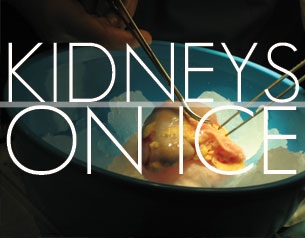Kidneys on Ice
Is it wrong to sell your own kidney? Or to buy an illegal organ if it could save your life? A shocking and exclusive new film on an intractable subject.
 In a world where everything is for sale, is it wrong to sell your own kidney? Or to buy an illegal organ if it could save your life? Every year 15,000 human organs are trafficked from impoverished Europeans to recipients in more privileged countries. A shocking and exclusive new film on an intractable subject.
In a world where everything is for sale, is it wrong to sell your own kidney? Or to buy an illegal organ if it could save your life? Every year 15,000 human organs are trafficked from impoverished Europeans to recipients in more privileged countries. A shocking and exclusive new film on an intractable subject.
The traffic often occurs entirely in Western Europe. Anatoli is poor and looking for work in Germany. He's approached by organ traffickers who persuade him to have German Doctors remove his kidney. He tells the doctors that he will give it to a sick family member. 'They advised me what to say, how to talk, how to give ... everything'. After the operation he hands over the kidney to the traffickers for $10,000. Professor Muhlbacher has been tricked into performing such operations, 'investigations were carried out as usual and they were performing and acting and we just believed them'.
One million people die each year of kidney failure. Only 60,000 receive kidney transplants. Many people who need new kidneys will do anything, to get one. They will pay anything. Anja has severe kidney failure and relies on dialysis to live. 'Being in dialysis, its like a vacuum in your head...you can't remember stuff and sometimes you are entirely sick.' But Anja is one of the lucky ones; she receives a kidney and her transplant goes well. 'It's kind of like being reborn...Being able to speak properly again...You feel more intelligent.'
'I thought that I'm not going to die,' explains Mihail, when he first considered selling his kidney to traffickers. 'They offered me $3,000 and I've never seen that much money, and because of the joy, I didn't think of anything else.' Mihail was 26 years old when he sold his kidney in search of a better life in Moldova.
A few days after the operation in Turkey, the traffickers dumped Mihail on a bus back to Moldova with no painkillers or travel documents. He was forced to bribe the border police with $500 to get home. 'Afterwards I wanted to work but I couldn't...it hurt.' The lack of medical treatment and need to avoid hard work means people never fully recover from their operations. 'I didn't know when I went, how it will be, but now I'm sorry.' Six years on, Mihail is back to living hand to mouth.
Former policeman, Marin, is serving ten years in prison after being convicted of organ trafficking. Marin became involved when his sick one-year-old son needed a liver transplant to survive. When Marin heard the news, he became desperate. 'Running around and looking for this money, I ran into these people that were dealing with organ trafficking'. Marin agreed with the traffickers to sell his kidney in exchange for the funds to finance his child's liver transplant. But the operation didn't turn out well. 'The baby died. I was left handicapped, without a kidney, and the baby died.'
Austria has one of the highest organ donation rates in Europe. Professor Muhlbacher explains that in Austria, 'everyone is presumed to be in agreement with organ donation after death.' So in a world where the legal supply simply does not meet demand and illegal trafficking is increasing, should other countries follow Austria's example of increasing their donor rate by changing the law?
Director: Anja Dalhoff
FULL SYNOPSIS
Director: Anja Dalhoff
